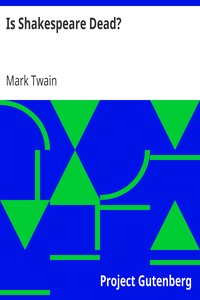Is Shakespeare Dead? by Mark Twain
"Is Shakespeare Dead?" by Mark Twain is a reflective and satirical treatise on the authorship of Shakespeare’s works, written during the early 20th century. In this work, Twain grapples with long-standing debates over who truly wrote the plays attributed to Shakespeare, questioning the historical record and delving into the inconsistencies surrounding the poet's life. The narrative combines Twain's autobiographical anecdotes with a sharp critique of literary pretensions and the human tendency to
believe in grand claims without substantial evidence. The opening of the book introduces Twain's perspective on the elusive nature of historical truths, particularly regarding Shakespeare. He shares recollections of discussions with a passionate pilot named Ealer, who held firm beliefs about Shakespeare's authorship, which Twain initially supported. However, as the dialogue progresses, Twain's skepticism grows, leading him to adopt a more nuanced stance. He reflects on the contradictions in Shakespeare's background and the scant evidence of his literary genius, positing that the legendary figure may not have penned such profound works. This mix of humor and critique sets the stage for Twain's examination of the broader implications of literary legends and the nature of belief itself. (This is an automatically generated summary.)
Read now or download (free!)
| Choose how to read this book | Url | Size | ||||
|---|---|---|---|---|---|---|
| Read online (web) | https://sendtokindle.compellingsciencefiction.com/ebooks/2431.html.images | 153 kB | ||||
| EPUB3 (E-readers incl. Send-to-Kindle) | https://sendtokindle.compellingsciencefiction.com/ebooks/2431.epub3.images | 126 kB |
Send
to kindle email: |
|||
| EPUB (no images, older E-readers) | https://sendtokindle.compellingsciencefiction.com/ebooks/2431.epub.noimages | 126 kB | ||||
| Kindle | https://sendtokindle.compellingsciencefiction.com/ebooks/2431.kf8.images | 257 kB | ||||
| older Kindles | https://sendtokindle.compellingsciencefiction.com/ebooks/2431.kindle.images | 240 kB | ||||
| Plain Text UTF-8 | https://sendtokindle.compellingsciencefiction.com/ebooks/2431.txt.utf-8 | 143 kB | ||||
| Download HTML (zip) | https://www.gutenberg.org/cache/epub/2431/pg2431-h.zip | 124 kB | ||||
| There may be more files related to this item. | ||||||
About this eBook
| Author | Twain, Mark, 1835-1910 |
|---|---|
| Title |
Is Shakespeare Dead?
From My Autobiography |
| Note | Reading ease score: 64.2 (8th & 9th grade). Neither easy nor difficult to read. |
| Credits | Transcribed from the 1909 Harper & Brothers edition by David Price. Proofing by Alan Ross, Ana Charlton and David |
| Language | English |
| LoC Class | PR: Language and Literatures: English literature |
| Subject | Shakespeare, William, 1564-1616 -- Authorship -- Baconian theory |
| Category | Text |
| EBook-No. | 2431 |
| Release Date | Dec 1, 2000 |
| Most Recently Updated | Jul 7, 2008 |
| Copyright Status | Public domain in the USA. |
| Downloads | 497 downloads in the last 30 days. |
| Project Gutenberg eBooks are always free! | |

